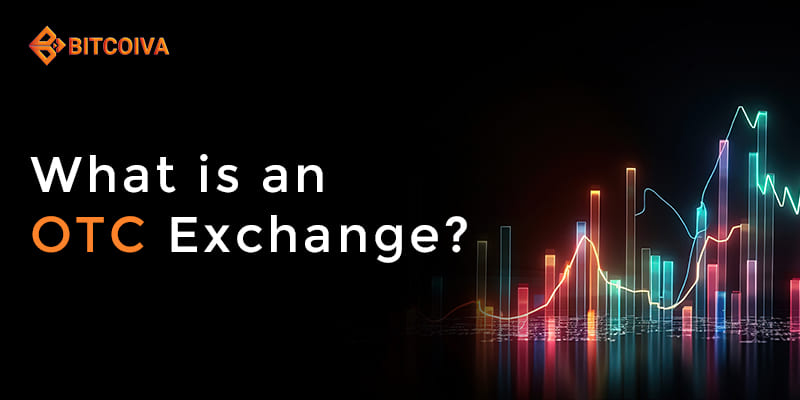Introduction to OTC Exchange
Over-the-counter exchanges have emerged as a key in the dynamic world of cryptocurrencies, which offers a efficient alternative and unique in the traditional crypto exchange platform. As per the needs of traders, individual investors and institutioanl groups, OTC exchanges offers several benefits in its enhanced liquidity and personalized services. Let’s discuss with the concepts of OTC, its working model, and its significance in the crypto landscape.
What is Meant by OTC Crypto Exchange?
An Over-the-Counter (OTC) crypto exchange refers to a decentralized marketplace where the direct trading of digital assets occurs between two parties without an intermediary order book. OTC platforms enabling participants to buy or sell substantial quantities of cryptocurrencies at negotiated prices and facilitate large-scale transactions off the public order books. The entities of the OTC exchange deals with significant volumes, offering privacy, minimizing market impact, and tailoring execution strategies.
How Does the OTC Crypto Exchange Work?
- Direct Transactions: OTC exchanges facilitate direct transactions between buyers and sellers. Participants connect with OTC desks or brokers who act as intermediaries to match orders efficiently.
- Price Negotiation: OTC trades involve price negotiation, allowing parties to agree on a favorable rate based on prevailing market conditions and the size of the transaction. This flexibility is desirable for large trades that may impact market prices on traditional exchanges.
- Reduced Slippage: OTC trading mitigates the impact of large transactions on market prices, reducing slippage concerns that often arise when executing substantial orders on public exchanges.
- Increased Privacy: Participants in OTC transactions benefit from increased privacy. Trades are not publicly recorded in order books, providing a level of discretion particularly valued by institutional investors.
- Personalized Services: OTC desks typically offer customized services catering to each client’s needs. It may include market insights, risk management strategies, and assistance with compliance procedures.
Why Choose OTC Crypto Trading?
- Reduced Impact: OTC trading minimizes the impact of large trades on market prices, ensuring more favorable execution for substantial transactions.
- Enhanced Privacy: Participants can execute trades with greater privacy than public exchanges, appealing to entities requiring discretion in their trading activities.
- Tailored Solutions: OTC desks provide tailored solutions and expert assistance, catering to the specific requirements of institutional investors and high-volume traders.
- Efficient Execution: OTC exchanges facilitate swift and efficient execution, allowing participants to transact significant volumes without causing disruptions in the broader market.
Crypto OTC vs. Normal Exchange
Understanding the distinctions between Crypto Over-the-Counter (OTC) and traditional crypto exchanges is crucial for navigating the dynamic crypto landscape.
1. Trade Execution Model
- Crypto OTC: OTC trades occur directly between two parties, facilitating off-exchange transactions. The process involves negotiation and personalized deal structures.
- Regular Exchange: Traditional exchanges operate on a centralized order book system, where buyers and sellers place orders that are matched automatically based on predetermined criteria.
2. Order Size
- Crypto OTC: Primarily designed for large transactions, OTC desks cater to institutional investors and high-net-worth individuals seeking to execute significant orders without impacting market prices.
- Regular Exchange: Suitable for trades of various sizes, from small retail transactions to large institutional volumes, depending on the liquidity of the specific exchange.
3. Price Determination
- Crypto OTC: Prices in OTC trades are negotiated between the parties involved, providing flexibility for customized rates based on market conditions and the transaction size.
- Regular Exchange: Prices on traditional exchanges are determined by supply and demand dynamics, following the market’s order book.
4. Privacy and Anonymity
- Crypto OTC: OTC transactions offer increased privacy as they are not publicly recorded on order books, making them attractive to entities seeking more discretion.
- Regular Exchange: Transactions on traditional exchanges are visible on public order books, providing transparency but reducing privacy.
5. Market Impact
- Crypto OTC: Large transactions on OTC desks aim to minimize market impact, preventing significant price fluctuations that may occur with substantial orders on public exchanges.
- Regular Exchange: Executing significant orders on a traditional exchange may result in slippage, impacting market prices due to the visible nature of these transactions.
6. Personalized Services
- Crypto OTC: OTC desks often provide personalized services, including market insights, risk management strategies, and tailored assistance to meet the specific needs of clients.
- Regular Exchange: Traditional exchanges typically offer standardized trading services, with limited customization based on individual requirements.
While regular exchanges provide a standardized and transparent trading environment suitable for various traders, Crypto OTC offers a more flexible and personalized approach, particularly beneficial for entities involved in substantial transactions requiring discretion and minimal market impact. Understanding these differences allows traders and investors to choose the platform that aligns with their needs and trading strategies.
In conclusion, OTC crypto exchanges have become crucial to the cryptocurrency ecosystem, offering a refined and flexible trading environment. Due to its enhanced privacy, efficient execution, or personalized services, participants in the crypto space are increasingly turning to OTC platforms for their trading needs.
Visit us at: www.bitcoiva.com

